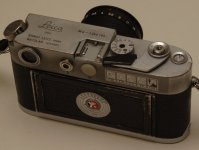WoolenMammoth said:
bmattock, please dont confuse not wanting to be contradicted with not wanting to debate an issue which is so to the heart of banality that is, for my logic and experience, on par with debating wether water is wet.
I'm sorry you seem to be getting angry - I assure you I am not. As to the 'banality' of my argument - I think you need to look that word up; it does not mean what you seem to think it means.
If you want to get into repeatability, take for instance, the sun. I believe we have a few planetary laws based around its repeatability. How many tims do you need to meter at 3pm in July at a given altitude and longititude in clear sunlight to know what it is? Four times? Six if you sat in the back of class?
Exactly my point. The sun, as steady and constant as it is, does not deliver the same amount of light in every clime and place. One might well know that Sunny-16 will work under situations one has faced before - as long as indeed, the conditions are as one expects.
The sun is repeatable. The light that reaches us is only occasionally repeatable, and even then - we can easily misjudge it. Fortunately, film latitude often conceals our failure from us.
I have a pretty good idea how fast I'm driving on a particular road. But it is just a guess, and I could be off by a lot, depending on local conditions I failed to take into account. My ass is a poor velocity measurement device - and your eyes are a poor light measurement device.
This is hardly rocket science we are discussing. And for good measure, wether professionals are in your opinion "real world" or not has absolutely no bearing on your original statement suggesting that people cant train their eyes to judge exposure.
People
cannot train their eyes to judge exposure. They can learn through experience to recognize similar conditions - and if they are RIGHT, then their exposure will be right. If they are WRONG, then their exposure will be wrong. Your example was merely a set of conditions that - as you stated - were tightly controlled to BE repeatable. I repeat for emphasis that not many of us as photographers will be so fortunate as to be given the same controlled photographic situation over and over again.
Human eyes lie or are fooled - about many things. The eye-brain combination is fooled by optical illusions, by perspective, by distance, and most certainly by light levels. The human eye shares - as I said - only one attribute that film or digital image sensors have - they record light. They do not work in the same ways at all, and they adjust without bothering to tell you that they're doing so.
Whats far more amusing to me is the idea that after 30 years of metering one wouldnt *expect* to be able to judge, let alone the insinuation that it is impossible to do.
It is absolutely, 100% impossible to do. And it is because your eyes (and mine) are imprecise measuring devices.
In the end, there are enough people out there that can and do do this consistently, and for VERY high stakes, I might add, that your opinion on the matter really has no impact on the reality of the situation at hand.
As I have said - no they do not, and no they cannot. They can use their experience to judge conditions they have faced over and over again - and if they are incorrect about those conditions, their guesses will also be incorrect. They do not judge the light - they remember similar conditions and the chances are high - under their controlled conditions - that they are right.
Dont let that stop you from believing whatever you like. You might reconsider educating others on the matter though... I cant do it, but others can and I sure dont believe in magic.
Certainly you believe in magic. You have a light-sensing device - your eye - which cannot be calibrated to any known standard, and you think it will tell you anything that can be transliterated to a precise setting like a photographic exposure. It's like a speedometer with no numbers on it.
As to my qualifications to educate others - I can do so because, as I also said earlier, I'm very smart. Also good looking. I know what I'm talking about and you clearly do not - at least on this subject.
There are also guys that, OOOOOOOOOOOOOOH, can judge distance to the inch by eye. Id love to hear you deconstruct that ability, lol.
I have no idea why I would want to. Stick to the 'banal' point or retire from the field, if you please.


